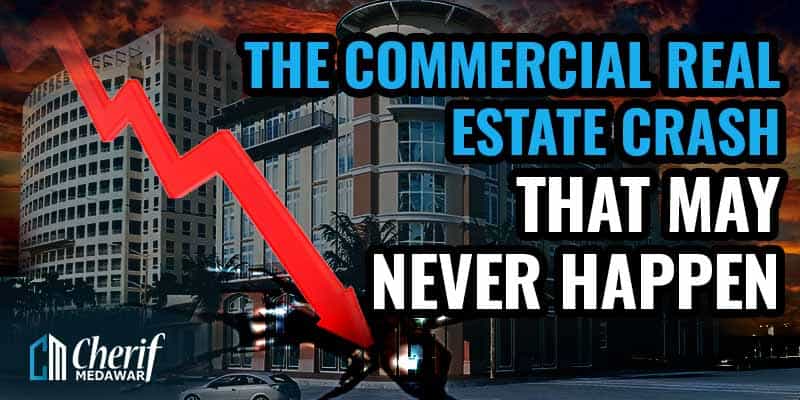Commercial real estate has long been a dependable investment choice for those seeking portfolio diversification and consistent profits. However, the impacts of the Covid-19 pandemic has many questioning the future of the commercial real estate market, with some experts predicting a crash on the horizon. This article will examine the factors influencing the commercial real estate market and determine if a crash is inevitable.
State of the Commercial Real Estate Market
Commercial real estate is a broad term that encompasses various properties, including office buildings, hospitality, retail space, and industrial facilities. The market has grown steadily with solid demand and rising property values in recent years. However, the outcome of the Covid-19 pandemic has significantly impacted the commercial real estate market, as businesses have been forced to close or curtail their operations.
Many commercial property owners need help to make ends meet with high vacancy rates and declining rents. The rise of remote work and e-commerce has changed the demand for office and some retail space, with many businesses rethinking their space requirements.
Factors Affecting the Commercial Real Estate Market
While the Covid-19 pandemic has significantly impacted the commercial real estate market, it is not the only factor affecting its future. Here are some other factors to consider:
Interest rates: Low-interest rates have made borrowing more affordable, increasing demand for commercial property. Though the Feds keep increasing rates, they are still relatively low in comparison to the past 30 years.
Economic Growth: Economic growth is closely linked to the demand for commercial real estate, as businesses need space to operate.
Population: As the population ages, demand for certain commercial property types, such as healthcare facilities and senior housing, is expected to increase.
Technology: Technology has significantly impacted the commercial real estate market, with e-commerce and remote work changing the demand for office and retail space.
Commercial Real Estate Crash Case
Despite positive factors affecting the commercial real estate market, some experts are predicting a crash in the near future. Here are some reasons:
Overbuilding: Some experts believe developers have overbuilt in specific markets, leading to an oversupply of commercial properties. Specifically strip malls and retail centres with more than one retailer or business.
Debt Levels: The commercial real estate market has seen significant borrowing levels in recent years, making it vulnerable to a recession.
Economic Uncertainty: The backlash of the Covid-19 pandemic has created widespread economic uncertainty, which may reduce demand for commercial properties. Also affecting hiring capabilities, foot traffic in some areas and reserves.
Why a Crash May Never Happen
Many factors could lead to a crash in the commercial real estate market, but there are many reasons to believe that a crack may never happen. Here are some reasons:
Strong Fundamentals: Despite the challenges posed by the (2020-2022) Covid-19 pandemic and the current economy, the commercial real estate market is built on solid fundamentals, which require businesses to have physical space to operate.
Low-interest rates: Low-interest rates have made borrowing more affordable, which has helped support the commercial real estate market. Low interest rates is relative. We are looking at the long model. Today, May 3, 2023, the Feds are increasing rates another 25; therefore, the margins are getting tighter.
Demand for alternative investments: With other investment options, as the stock market becomes increasingly volatile, investors are turning to commercial real estate as a haven for their money. And there are opportunities in the right market and with the right asset to reposition the property for the big win.
The Future of the Commercial Real Estate Market
It is impossible to predict the future of the commercial real estate market with certainty, it is clear that the industry faces significant challenges. However, it is also clear that the market is resilient, and there are reasons to believe it will continue to thrive. As businesses adapt to the challenges posed by the 2020-2022 pandemic, demand for commercial property will likely evolve, and the industry will continue to innovate and grow and reposition.
After all, certain factors ultimately lead to a commercial real estate crash, but that doesn’t necessarily happen. The industry has faced significant challenges recently but has shown resilience in adversity. While the ongoing economy has created uncertainty and disruption today, it will adjust. And the post pandemic environment is driving innovation and evolution in the market. As businesses adapt the demand for commercial properties will likely shift and change, but the basic need for physical space to operate will remain.
Conclusion
Finally, however great the factors that lead to a commercial real estate crash may be, such an outcome is not inevitable. The industry has faced significant challenges over the years but has shown resilience despite adversity. For example, the pandemic created a problem for some business, but others thrived. And the world we live in and operate business in will continue to drive innovation and evolution in the market. As businesses continue to adapt, demands for properties will likely change, but the basic need for physical space to operate will remain.
Long-term commercial real estate sector issues include increased automation and changing customer tastes. The market will probably continue to change and adapt, as it has in the past. Economic development, interest rates, and technological progress, will determine the direction of the commercial real estate market. Although there may be some obstacles, the industry has proven capable of facing difficulties and becoming more assertive.
Cherif Medawar is a Best Selling Author, Speaker, Fund Manager, and leading commercial real estate investing Consultant in the United States and Puerto Rico. There will be many opportunities in 2023, for investors to break into commercial real estate and scale their current business– you just need to understand that the money is in the structure. Read Cherif’s book and get the story on how he started and how he launched his first Real Estate Fund (Regd 506b) in the midst of the last recession. BLUE OCEAN OPPORTUNITIES IN COMMERCIAL REAL ESTATE Get Your Free Copy!


